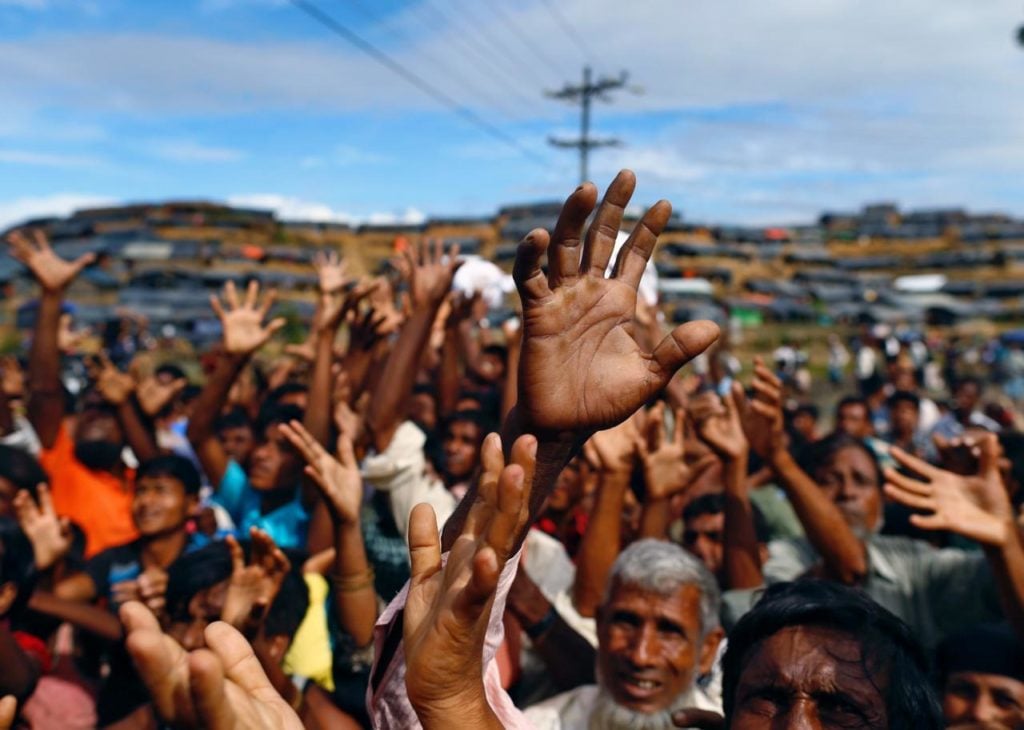Will Myanmar's military face justice over Rohingya 'genocide'?

Agency
August 29, 2018

Bangkok –A UN probe has called for Myanmar's military leaders to face justice for alleged genocide and crimes against humanity against the Rohingya, but the road to a tribunal will be long and complex, with China likely to block any prosecution of its ally at the International Criminal Court.
On Monday a damning report by a UN fact-finding mission said members of Myanmar's armed forces, including military chief Senior General Min Aung Hlaing, should be prosecuted for their roles in violently expelling some 700,000 Rohingya Muslims into neighbouring Bangladesh.
Refugees have recounted widespread stories of rape, murder and arson by security forces as they were driven from their homes.The report was the most serious step towards accountability in the crisis to date but experts warn of major legal and diplomatic obstacles ahead.
- What's the quickest route to justice for the Rohingya? -
The International Criminal Court (ICC) in the Hague. For proceedings to begin, the United Nations Security Council needs to refer Myanmar to the court.But geopolitics is likely to get in the way with China and Russia -- which last week hosted Min Aung Hlaing -- able to veto any referral.
China has consistently refrained from condemning Myanmar for its treatment of the Rohingya, describing it as an internal matter. "Rakhine State has very complex historic, ethnic and religious background," Chinese foreign ministry spokesperson Hua Chunying told reporters on Tuesday."So how to resolve this problem? Through negotiation and dialogue," she said, adding: "I think that blame on any side, or pressure, does not help resolve anything."
The Security Council is set to discuss Myanmar later Tuesday in New York.
- What about Plan B? -
If legal moves for the ICC stall at the Security Council, it could consider an ad hoc or mixed tribunal similar to ones created for Rwanda, Yugoslavia, Lebanon and Cambodia.This would in theory require the cooperation of national authorities in Myanmar.
Another possibility stems from an unprecedented request by the chief prosecutor at the ICC, Fatou Bensouda, to extend its jurisdiction to Myanmar, which has not signed up to the court.
That's "uncharted territory", according to Kingsley Abbott of the International Commission of Jurists, who says the move may be possible because they crisis spilled over into Bangladesh, a member of the ICC.If the court agrees, the prosecutor could launch a preliminary investigation and ultimately issue arrest warrants for Myanmar nationals.
But this would take time, requiring participation from Bangladesh in the investigation and -- somewhat implausibly -- Myanmar to hand over suspects.
- Who could be prosecuted? -
AFP/File / YE AUNG THUThe UN probe names six senior members of Myanmar's armed forces including military chief Min Aung Hlaing
The court targets individuals, not countries. On Monday the UN probe named six senior members of the armed forces including military chief Min Aung Hlaing.Investigators argue they bear responsibility because of their direct command over troops that carried out "clearance operations" in northern Rakhine state.But the ICC cannot forcibly bring suspects from Myanmar, and would have to rely on member states to detain them in the event they travel abroad.This has been problematic in the past.
In December 2017 war crimes judges criticised Jordan for failing to act on the Hague's warrant to arrest Sudanese leader Omar al-Bashir.
- Could Aung San Suu Kyi face trial? -
Highly unlikely. The current calls are aimed at the upper echelons of Myanmar's security forces, and the Nobel laureate has no control over the military.But the UN probe did call her out for not using her position as leader of the civilian government or her "moral authority" to try to stem the violence.
It also accused her administration of denying any wrongdoing, blocking the UN investigation, and spreading false narratives."Through their acts and omissions, the civilian authorities have contributed to the commission of atrocity crimes."
- How is this playing out inside Myanmar? -
Myanmar has long denied accusations it committed ethnic cleansing or genocide.AFP/File / ROMEO GACADMin Aung Hlaing's military campaign has enjoyed support from Myanmar's public
It has reserved particular scorn for the ICC prosecutor's request on jurisdiction.In August the government branded it "meritless" and called for it to be dismissed.Myanmar says it has also established its own independent commission of inquiry -- a panel critics say is toothless.
The stateless Rohingya garner little empathy inside Myanmar and Min Aung Hlaing's military campaign has enjoyed support from the public, many of whom see it as a defence of the country from militants.
---


Leave Comment